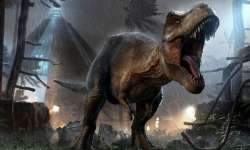'This dinosaur replaced all its teeth every two months'
A meat-eating dinosaur that lived in Madagascar about 70 million years ago replaced all its teeth every couple of months or so, according to a study.

A meat-eating dinosaur that lived in Madagascar about 70 million years ago replaced all its teeth every couple of months or so, according to a study. The study, published in the journal PLOS ONE, noted that the dinosaur, named Majungasaurus, grew new teeth in each socket every couple of months, which is two to 13 times faster than the rates estimated in other carnivorous dinosaurs. The researchers, including those from Adelphi University in the US, said the dinosaurs of this species were wearing down their teeth quickly, possibly because they were gnawing on bones.
To perform this study, the scientists used a collection of isolated fossil teeth to examine microscopic growth lines in the teeth.
They said these growth lines are similar to tree rings, but instead of being deposited once a year, they were deposited daily.
The team also used an X-ray based scanning technique called computerized tomography (CT) on intact jaws to visualise unerupted teeth growing deep inside the bones.
Using these techniques, the researchers estimated tooth-replacement rates in a large number of individual jaws, and they also cross-checked their results.
"There is independent evidence for this in the form of scratches and gouges that match the spacing and size of their teeth on a variety of bones - bones from animals that would have been their prey," said study co-author Michael D. D'Emic from Adelphi University.
D'Emic said gnawing on bones was likely a way for the dinosaur to ingest certain nutrients -- a behaviour also seen in modern day rodents.
It requires exceptionally strong teeth which Majungasaurus did not have, he said.
"That's our working hypothesis for why they had such elevated rates of replacement," D'Emic said.
The researchers said the rapid-fire tooth growth puts Majungasaurus in the same league as sharks and big, herbivorous dinosaurs.
D'Emic said paleontologists have analyzed tooth-replacement rates for only about a half-dozen of dinosaurs so far.
"I'm hoping this latest project spurs more people to study other species. I bet that will reveal further surprises. And hopefully that will lead to a better understanding of how dinosaurs evolved to be successful for so long," he said.
Also Read: ISRO to launch Chandrayaan-3 in 2020
Also Read: 2020 will be the year of Chandrayaan-3 and Gaganyaan: ISRO chief K Sivan